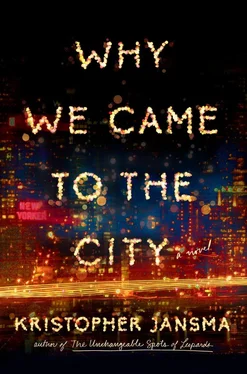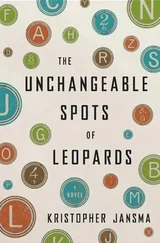“Allen—”
“I’m saying, George. It’s not too late to get on board with this paper I’m writing.”
“ You’re writing?”
“Okay, okay — we’re writing. We’re going to watch the collapse in real time, G-man. That’s rare as shit. We’re talking ‘target of opportunity.’ We’re talking you and me are going to get time on the motherfucking Hubble ,” Allen said, standing quickly. “Look, I’ve got a lunch with Cokonis. I’m going to catch him up on all this. Think it over. If this is what I think it is, you don’t have a lot of time to start writing grants.” He was practically skipping as he left the cubicle.
“Oh, and by the way, I’m getting married…” George said to the empty air. There was a long quiet, and then steadily he heard the clack of keyboards and the squeak of chairs from the other cubicles all up and down the hallway. The click of phones being put back into their cradles, the hum of fluorescent lights, the scuffing of rubber soles on carpeting.
Allen was right. George knew it. He had been massively wrong about everything leading up to it, but aside from that fact, 237 Lyrae V’s collapse could actually be huge for them. Shouldn’t he want that?
George rolled his chair over to Allen’s computer, where he’d left the interface open for the Phoenix-13 telescope. Pausing the data stream Allen was downloading, George’s fingers typed in the set of complex coordinates without conscious thought: Right ascension of 18 h53 m35.079 s. Declination of +33°01′ 45.03. There was a long pause as the telescope, twenty-five hundred miles away in Arizona, adjusted its mechanized gaze to a completely different part of the universe. The sheer scale of these little keystrokes still floored George some days and still briefly distracted him from the heinous particulars of his job — that morning consisting of ten e-mails in two hours from Cokonis about getting the next round of grants written up, about publishing his next paper, about presenting at a conference in Wichita.
The images began to come up on the screen. The Ring Nebula, aka Messier 57, aka NGC 6720. A planetary nebula in the constellation Lyra, a great reddish ring of fire surrounding an iris of blue-green like ocean water. On the sad little computer monitor, George couldn’t see much detail, but he knew it glowed like an ember on the big infrareds… and that it was, in its way, an ember, left over when a star exhausted its supply of hydrogen and the outer layers pushed outward and it became a red giant. He zoomed the telescope to its maximum point and found his little core inside the nebula. Just a hundred thousand years old. Practically an infant in cosmic terms, emitting no light, only heat and gas, but he knew it was there.
He’d first seen the Ring Nebula in AP Physics C. Mr. Pix had put it up on a color transparency, explaining, “Every once in a while, a dusty red giant star can become a nebulae, like M fifty-seven, here, which contains an unknown number of nebulosities, and in this way, one dying star becomes a kind of breeding ground for new ones.”
George had been stunned. Until then they’d been so fixated on heat death and entropy and black holes that he’d never stopped to think about the fact that the universe was constantly generating new stars. Against all the data it now seemed as if 237 would become one of them. But, as Sara had reminded him, its fate was sealed. Whatever was happening had happened already. The weak light he could see had left the star two millennia ago. It had all been over and done with back in the days of Babylon and Plato, when the first astronomers had turned their lenses toward the black sea above them and ventured to look more closely at those white shining spirits. His little dot was just one in 400 billion, but George didn’t care. It was his, and he whispered to it, there in his cubicle, “Don’t you die on me.”
2
How exactly like George, Sara thought, to ask someone to marry him at three in the morning, when she couldn’t call everyone she knew. She considered this while waiting for Irene to arrive for lunch — already twenty-five minutes late. Maybe there had been news, and Irene had decided to bail. She was a disappearance artist, Irene was. Days or weeks could go by without contact, either because she was working on a new piece or because of something personal. She could be maddeningly private. Evading the circling of an impatient waiter, Sara pretended to be on her phone while she replayed the weekend’s events in her mind.
For the first two minutes after George had asked, she’d said almost nothing but “Oh my God” until George reminded her she technically hadn’t said yes yet, and so then she said yes for the two minutes that followed. But after those four minutes were over, she had wanted nothing more than to burst into the bedroom Irene and William had vanished into, except maybe to call her parents in Gloucester, except maybe to call her sister in Vancouver, except maybe to call Sue, her best friend from third grade, and then there were her grandparents in Sacramento and Austin… but it was still after midnight there and everywhere else.
“Let’s call your cousin Peg in London!” Sara had shouted, leaping from the hot tub and hardly pausing to wrap herself in a towel before rushing to find a phone.
“It’s only eight there,” George had said.
“Call her, call her, callllllll her!” Sara had screeched happily. While George hunted down his phone, she continued to make erratic squeaking noises.
“I don’t have her new number,” George concluded after investigating his contacts list.
Sara grabbed the phone and began flipping through, looking for people to call. “Do you ever clean this thing out? You still have your RA’s number from freshman year.” Then she clapped. “Jacob! Let’s tell Jacob!”
She was inside the hotel again before George could catch up to her. There they found Jacob wearing nothing but couch cushions.
“Wake him up!” Sara insisted. “He’s your friend.”
“You’ve known him practically as long as I have!”
“But you knew him first,” she insisted. “So technically he’s your friend.”
George thought about this. “Does that mean I get to tell Irene too?”
“Don’t be ridiculous. She’s a girl. It’s completely different.”
“Completely different according to who?”
“Polite society,” she insisted. “And it’s ‘according to whom. ’ ”
George looked dubiously downward at their naked, snoring friend and begrudgingly poked him in the shoulder. Sara had to hand it to him — Jacob seemed neither polite nor social as he made a half-snarl and shifted, exposing one gigantic pale buttock. She sighed and gave Jacob a hearty slap on the back of the head. When this succeeded in opening just one of the boy’s bleary eyes, she looked at him squarely and said, “George has something to tell you.”
The bloodshot pupil had swiveled in its socket toward George, who stammered at it, “We’re… um. We’re engaged!”
There’d been a short silence, and then, in a growl from deep beneath a throw pillow, Jacob had said, “Engaged in what exactly?”
“To be married, you ass!” Sara shouted happily, bouncing on the couch beside him.
Jacob snorted, closed his eye, and said, “Does this mean Sara’ll finally stop being a puritan priss and move into your place?”
“Obviously,” George said, just as Sara said, “ George’s place?”
They paused, each sure the other was joking.
“Who’s moving in with who?” George had asked.
“With whom ,” Jacob and Sara both corrected him at once.
That matter had still not been settled. And Jacob hadn’t been the last to ask. Her parents had asked almost immediately, as had his. It was ridiculous that George imagined she could move into his place. It was hardly big enough for even one person to move around in. Granted it was on Riverside, in a beautiful prewar building, a stone’s throw from the park and close to Zabar’s. And of course it was insanely cheap, which was why George had remained in this prison cell, with its single sad window that wasn’t wide enough for an air conditioner. And people never believed her when she said this, but his shower was inside his kitchen! The toilet, then, was in another room the size of a coat closet, with no sink. But the worst thing by far was that his bed folded up into the wall. Yes. George Murphy, her soon-to-be husband, slept on a Murphy bed.
Читать дальше












